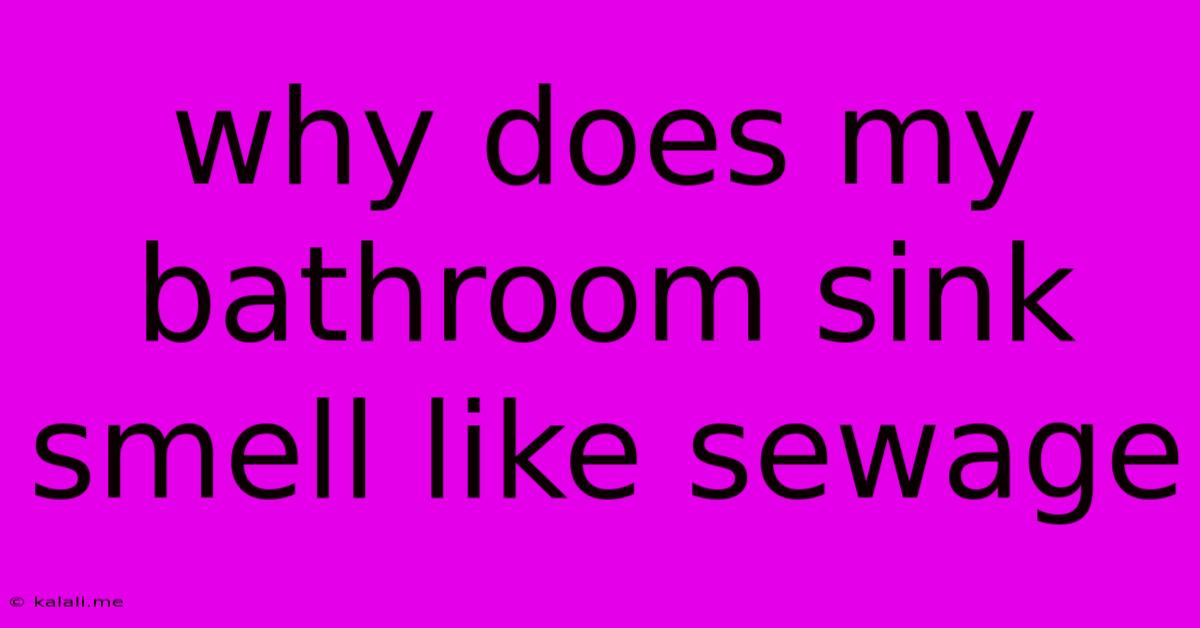Why Does My Bathroom Sink Smell Like Sewage
Kalali
Jun 10, 2025 · 4 min read

Table of Contents
Why Does My Bathroom Sink Smell Like Sewage? A Comprehensive Guide to Troubleshooting Foul Odors
A foul-smelling bathroom sink is far from pleasant. That sewage-like odor can quickly turn a relaxing bathroom experience into a nauseating one. This comprehensive guide will explore the common culprits behind this unpleasant aroma and offer practical solutions to get your sink smelling fresh again. We'll cover everything from simple fixes to more involved plumbing issues, empowering you to tackle the problem effectively.
Understanding the Source of the Smell
The unpleasant sewage smell emanating from your bathroom sink usually indicates a problem with your plumbing system. Several factors can contribute to this issue, including:
-
Dry P-trap: The P-trap is a curved pipe under your sink designed to hold water, acting as a seal to prevent sewer gases from entering your home. If this water evaporates, sewer gases can freely flow upwards, causing that awful smell. This is often the simplest and most common cause.
-
Clogged Drain: A slow-draining or completely clogged sink can trap debris and organic matter, creating a breeding ground for bacteria that produce foul-smelling gases. This is especially true if you've noticed a significant reduction in drainage efficiency.
-
Plumbing Vent Issues: Your plumbing system uses a vent pipe to allow air to escape, preventing pressure buildup. If this vent is blocked or damaged, pressure imbalances can force sewer gases back up through your sink drain. This is often a more complex issue requiring professional help.
-
Sewer Line Problems: In more severe cases, the smell could indicate a problem with the main sewer line itself. This might involve a crack, blockage, or other significant issue requiring professional attention from a plumber. A persistent odor, even after addressing other potential problems, usually points to this.
-
Old or Damaged Pipes: Over time, pipes can corrode or degrade, creating gaps that allow sewer gases to escape. This is particularly likely in older homes. You might notice other signs of pipe damage, such as leaks or discoloration.
Troubleshooting and Solutions
Let's tackle each potential problem and offer solutions:
1. Check and Refill the P-trap: This is the easiest solution and often resolves the issue. Simply locate the P-trap under your sink (usually a curved pipe). Pour a cup or two of water into the drain. The water should fill the P-trap, creating the necessary seal.
2. Clean the Drain: If the smell persists, your drain might be clogged. Try using a plunger to dislodge any blockages. You can also try using a drain cleaner, but follow the instructions carefully. If the clog is stubborn, you might need to use a plumbing snake to remove the obstruction.
3. Investigate the Plumbing Vent: This is a more advanced issue and often requires the expertise of a plumber. A blocked or damaged vent can lead to significant plumbing problems, so professional help is recommended.
4. Address Sewer Line Problems: A persistent smell, despite trying other solutions, suggests a potential sewer line problem. This necessitates contacting a qualified plumber for inspection and repair.
5. Inspect and Repair Damaged Pipes: If your pipes are old or damaged, replacing or repairing them is crucial to prevent ongoing odor issues and potential leaks. This is a more involved task and likely requires a plumber's assistance.
Preventing Future Smells
To prevent future sewage smells in your bathroom sink, consider these preventative measures:
- Regular Cleaning: Regularly clean your sink and drain to prevent buildup of debris.
- Pouring Boiling Water: Periodically pouring boiling water down the drain can help remove grease and organic matter.
- Using a Drain Protector: A drain protector can help prevent hair and other debris from clogging the drain.
- Prevent P-trap Drying: Run water down the drain occasionally, especially if you don't use the sink frequently.
A smelly bathroom sink can be frustrating, but by systematically investigating the potential causes and implementing the solutions outlined above, you should be able to identify and rectify the problem, restoring the fresh and clean atmosphere you desire in your bathroom. Remember, if you're unsure about tackling any plumbing issues yourself, it's always best to contact a qualified plumber for professional assistance.
Latest Posts
Latest Posts
-
How Many Cups Of Pasta In A Pound
Jul 01, 2025
-
How Many Tablespoons Are In 1 2 Ounce
Jul 01, 2025
-
How To Beat Level 29 On 40x Escape
Jul 01, 2025
-
Theres A Leak In This Old Building Lyrics Meaning
Jul 01, 2025
-
If I M 19 What Year Was I Born
Jul 01, 2025
Related Post
Thank you for visiting our website which covers about Why Does My Bathroom Sink Smell Like Sewage . We hope the information provided has been useful to you. Feel free to contact us if you have any questions or need further assistance. See you next time and don't miss to bookmark.